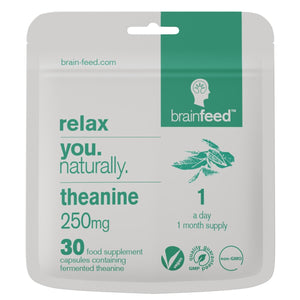Huberman sleep cocktail review: why you can skip l-theanine
filter
Key points
- Huberman sleep cocktail: theanine, magnesium threonate/glycinate & apigenin
- Supports relaxation, sleep quality, and longer duration
- Consistent schedule, dim lights & limited naps help enhance sleep quality
Every human on Earth needs good quality sleep for a well-functioning brain. Sleep helps you refresh your brain with a deep clean, learn and store important information and encourage communication between different brain parts [1 Trusted Source 2022 - National Institute of Neurological Disorders and Stroke 3rd-party source Brain Basics: Understanding Sleep ] . How much sleep do we need? Huberman, a world-renowned neuroscientist says 6 to 8 hours. Dr Andrew Huberman is a Professor of Neurobiology and Ophthalmology at Stanford University. He has taught over a million people about brain health through his podcast, the Huberman Lab Podcast. The NHS says that even though everyone needs different amounts of sleep, an adult needs 7 to 9 hours on average[2 Trusted Source 2021 - NHS 3rd-party source Insomnia ] . Besides getting enough sleep, getting optimal sleep should be a part of your self-care and you may wonder how to get your best sleep yet. So, what does the man with a PhD in neuroscience and 20 years of experience take for optimal sleep and is his sleep stack the best?
What does Huberman recommend for sleep?
Dr Huberman discussed a toolkit for sleep in his first newsletter for his podcast, the Huberman Lab. Sleep hygiene practices along with supplements can help improve sleep. The three supplements recommended as the best supplements for sleep, better known as the Andrew Huberman sleep cocktail were magnesium threonate, apigenin & theanine[3 Trusted Source 2021 - Huberman Lab 3rd-party source Toolkit for Sleep ] .
What is Andrew Huberman sleep cocktail?
Andrews Huberman's sleep cocktail consists of 3 supplements - theanine, magnesium and apigenin. He recommends taking these 30 to 60 minutes before bed every night.
100 to 400 mg of theanine to promote relaxation in 30 mins
Being stressed can be a barrier to getting good quality sleep. Feeling calm and relaxed can help you sleep faster and better. A nutrient extracted from green tea called l-theanine promotes relaxation without sedation[4 Trusted Source 2008 - Asia Pacific Journal of Clinical Nutrition Human study L-theanine, a natural constituent in tea, and its effect on mental state ] , [5 Trusted Source 2001 - Alternative and Complementary Therapies Research evaluation 200 mg of Zen: L-Theanine Boosts Alpha Waves, Promotes Alert Relaxation ] ,[6 Trusted Source 2016 - Nutrients Human study Anti-Stress, Behavioural and Magnetoencephalography Effects of an l-Theanine-Based Nutrient Drink: A Randomised, Double-Blind, Placebo-Controlled, Crossover Trial ] .
brain feed’s 250 mg l-theanine is a natural fermented form and each capsule contains 15-20 cups worth l-theanine.
Does l-theanine help sleep?
In short, only by relaxing your mind. As theanine works as a relaxant instead of a sedative, the question remains if including it in your sleep cocktail makes sense.
How effective is l-theanine for sleep?
If you tend to overthink before bed, theanine might help. Sleep quality is a term based on multiple sleep components, one of them being sleep efficiency which refers to the percentage of total time in bed that is actually spent sleeping[16 Trusted Source 2022 - Nursing Forum Systematic and meta-analysis Sleep quality: An evolutionary concept analysis ] . Higher sleep efficiency indicates better sleep quality. Overthinking can keep you awake for longer, and this is where theanine could help. The calming benefits of theanine could help you fall asleep after slowing down your racing thoughts. Find more tips on how to calm anxiety at night naturally. Theanine is great as an option to unwind before bed and it's easy to see why it has become associated with restful slumber. It's important to note if it's your sleep hormone, melatonin you are looking to boost - theanine misses the mark. In contrast to supplements like 5-htp and melatonin, theanine does not promote the onset of your sleep hormone melatonin which contributes to managing your sleep-wake cycle. Read more about the benefits of 5-htp for sleep if you’re interested in boosting your sleep hormone.
What is l-theanine good for?
Multiple studies have found that l-theanine calms you down, relaxes you, and reduces stress and anxiety levels[7 Trusted Source 2022 - Food Science and Human Wellness Research evaluation How does the tea L-theanine buffer stress and anxiety ] ,[17 Trusted Source 2022 - Food Science and Human Wellness Research evaluation How does the tea L-theanine buffer stress and anxiety ] . While having calming and soothing properties, it also keeps you mentally alert. Its ability to relax both the mind and body makes l-theanine an excellent option for those looking to relax but maintain mental clarity.
What does l-theanine do to your brain?
L-theanine acts on different chemicals in your brain. Multiple studies have demonstrated that l-theanine supplementation leads to an increased wakeful relaxation brain state shown by the so-called alpha brain waves[5 Trusted Source 2001 - Alternative and Complementary Therapies Research evaluation 200 mg of Zen: L-Theanine Boosts Alpha Waves, Promotes Alert Relaxation ] , [6 Trusted Source 2016 - Nutrients Human study Anti-Stress, Behavioural and Magnetoencephalography Effects of an l-Theanine-Based Nutrient Drink: A Randomised, Double-Blind, Placebo-Controlled, Crossover Trial ] , [18 Trusted Source 1998 - Journal of the Agricultural Chemical Society of Japan Research evaluation Effects of L-theanine on the release of alpha-brain waves in human volunteers ] . Additionally, l-theanine may increase GABA activity by mimicking its chemical structure[5 Trusted Source 2001 - Alternative and Complementary Therapies Research evaluation 200 mg of Zen: L-Theanine Boosts Alpha Waves, Promotes Alert Relaxation ] , [6 Trusted Source 2016 - Nutrients Human study Anti-Stress, Behavioural and Magnetoencephalography Effects of an l-Theanine-Based Nutrient Drink: A Randomised, Double-Blind, Placebo-Controlled, Crossover Trial ] , [19 Trusted Source 1999 - Trends in Food Science & Technology Research evaluation L-theanine-a unique amino acid of green tea and its relaxation effect in humans ] , [20 Trusted Source 2020 - Plant Foods for Human Nutrition Systematic and meta-analysis The Effects of Green Tea Amino Acid L-Theanine Consumption on the Ability to Manage Stress and Anxiety Levels: a Systematic Review ] . Higher GABA levels reduce anxiety and promote calmness. Furthermore, some research indicates that l-theanine can lower levels of the stress hormone cortisol, contributing to an overall sense of relaxation[20 Trusted Source 2020 - Plant Foods for Human Nutrition Systematic and meta-analysis The Effects of Green Tea Amino Acid L-Theanine Consumption on the Ability to Manage Stress and Anxiety Levels: a Systematic Review ] .
Is it better to take l-theanine day or night?
Theanine promotes relaxation within 30 minutes after taking it[4 Trusted Source 2008 - Asia Pacific Journal of Clinical Nutrition Human study L-theanine, a natural constituent in tea, and its effect on mental state ] . Theanine was also found to reduce stress levels within an hour of intake[7 Trusted Source 2022 - Food Science and Human Wellness Research evaluation How does the tea L-theanine buffer stress and anxiety ] . Therefore, it’s advised to take it during the day and at night around half an hour before you want help with calming down.
145 mg of magnesium to reduce insomnia by 15%
Magnesium is one of the most abundant minerals in the body and is involved in over 300 chemical reactions[8 Trusted Source 2012 - Journal of Research in Medical Sciences Human study The effect of magnesium supplementation on primary insomnia in elderly: A double-blind placebo-controlled clinical trial ] . It can be taken from the diet through adequate intake of nuts, whole grains, and soy products. It is available in many supplemental forms; what form is recommended for sleep by dr Huberman? Magnesium threonate is his top pick. This is a form that your body absorbs easily and is one of the few forms that can enter the brain[9 Trusted Source 2024 - Examine 3rd-party source Magnesium ] . Magnesium threonate was found to increase magnesium levels in the brain by up to 15% in 24 days[10 Trusted Source 2022 - Nutrients Human study A Magtein®, Magnesium L-Threonate, -Based Formula Improves Brain Cognitive Functions in Healthy Chinese Adults ] . Magnesium bisglycinate is another form of magnesium that is absorbed well by the body[9 Trusted Source 2024 - Examine 3rd-party source Magnesium ] . Magnesium’s role in sleep is associated with its involvement in the body clock (sleep-wake) cycle and its association with the stress system. Magnesium is involved in the production of your sleep hormone, melatonin[8 Trusted Source 2012 - Journal of Research in Medical Sciences Human study The effect of magnesium supplementation on primary insomnia in elderly: A double-blind placebo-controlled clinical trial ] . It was also found to decrease your stress hormone, cortisol[11 Trusted Source 2018 - Nutrients Human study Magnesium Intake and Sleep Disorder Symptoms: Findings from the Jiangsu Nutrition Study of Chinese Adults at Five-Year Follow-Up ] . Deficiency of magnesium was also seen in those with sleep disorders[8 Trusted Source 2012 - Journal of Research in Medical Sciences Human study The effect of magnesium supplementation on primary insomnia in elderly: A double-blind placebo-controlled clinical trial ] . Those with higher magnesium levels were found to sleep longer and had better sleep quality[12 Trusted Source 2022 - Sleep 3rd-party source Association of magnesium intake with sleep duration and sleep quality: findings from the CARDIA study ] , including reduced insomnia scores by almost 15%[8 Trusted Source 2012 - Journal of Research in Medical Sciences Human study The effect of magnesium supplementation on primary insomnia in elderly: A double-blind placebo-controlled clinical trial ] . Adding magnesium to your sleep care routine can help aid good quality sleep.
50 mg of apigenin to support longer sleep
Chamomile tea is often recommended in traditional medicine as a sleep aid[13 Trusted Source 2017 - Journal of Education and Health Promotion Human study Investigation effect of oral chamomilla on sleep quality in elderly people in Isfahan: A randomized control trial ] . A plant compound extracted from chamomile tea called apigenin has shown some benefit in promoting sleep[14 Trusted Source 2024 - Examine 3rd-party source Apigenin ] . Other sources of apigenin are parsley and artichokes. This nutrient has shown preliminary results in support of improving sleep by prolonging sleep time, thus promoting deeper sleep[15 Trusted Source 2020 - Nutrients Human study Specific Dietary (Poly)phenols Are Associated with Sleep Quality in a Cohort of Italian Adults ] . More research is needed to learn more about its mechanism.
What is the sleep cocktail with L-theanine?
Dr Huberman recommends starting with one supplement and adding as and if needed. He recommends the following doses 30 to 60 minutes before bed:
In addition to supplements, Huberman recommends:
- Waking up at the same time each day and going to bed when you are sleepy.
- Keeping lights dimmed between 10 pm and 4 am.
- Limiting day naps to 90 mins max.
Owing to sleep’s important role in brain health, taking steps to optimise sleep will reflect as improvements in your daily life.
References
[1] National Institute of Neurological Disorders and Stroke (2022). Brain Basics: Understanding Sleep | National Institute of Neurological Disorders and Stroke. https://www.ninds.nih.gov/health-information/public-education/brain-basics/brain-basics-understanding-sleep
[2] Insomnia (2021). NHS. https://www.nhs.uk/conditions/insomnia/#:~:text=Everyone%20needs%20different%20amounts%20of,need%209%20to%2013%20hours
[3] Huberman, A. (2021). Toolkit for Sleep. [online] Huberman Lab
[4] Nobre, A. et al. (2008). L-theanine, a natural constituent in tea, and its effect on mental state. Asia Pac J Clin Nutr, [online] 17(S1), pp.167–168. Available at: https://apjcn.nhri.org.tw/server/apjcn/17%20Suppl%201/167.pdf
[5] Mason, R. (2001). 200 mg of Zen: L-Theanine Boosts Alpha Waves, Promotes Alert Relaxation. Alternative and Complementary Therapies, 7(2), pp.91–95. https://www.liebertpub.com/doi/10.1089/10762800151125092
[6] White, D. et al. (2016). Anti-Stress, Behavioural and Magnetoencephalography Effects of an l-Theanine-Based Nutrient Drink: A Randomised, Double-Blind, Placebo-Controlled, Crossover Trial. Nutrients, [online] 8(1), p.53. https://www.mdpi.com/2072-6643/8/1/53
[7] Wang, L., Brennan, M., Li, S., Zhao, H., Lange, K.W. and Brennan, C. (2022). How does the tea L-theanine buffer stress and anxiety. Food Science and Human Wellness, [online] 11(3), pp.467–475. https://www.sciencedirect.com/science/article/pii/S2213453021001324?via%3Dihub
[8] Abbasi, B. et al. (2012). The effect of magnesium supplementation on primary insomnia in elderly: A double-blind placebo-controlled clinical trial. Journal of research in medical sciences : the official journal of Isfahan University of Medical Sciences, 17(12), 1161–1169. http://www.ncbi.nlm.nih.gov/pmc/articles/pmc3703169/
[9] Brady Holmer, B., Solomon, T., & Shkayeva, M. (2024). Magnesium. Examine. https://examine.com/supplements/magnesium/?srsltid=AfmBOoq0IKf7slAlbvwKIpsUkohOcfjy3yu3I9IawLXaQq6OXSbA5R81#what-is-magnesium
[10] Zhang, C. et al. (2022). A Magtein®, Magnesium L-Threonate, -Based Formula Improves Brain Cognitive Functions in Healthy Chinese Adults. Nutrients, 14(24), 5235. https://www.mdpi.com/2072-6643/14/24/5235
[11] Cao, Y., Zhen, S., Taylor, A. W., Appleton, S., Atlantis, E., & Shi, Z. (2018). Magnesium Intake and Sleep Disorder Symptoms: Findings from the Jiangsu Nutrition Study of Chinese Adults at Five-Year Follow-Up. Nutrients, 10(10), 1354. https://www.mdpi.com/2072-6643/10/10/1354
[12] Zhang, Y. et al. (2022). Association of magnesium intake with sleep duration and sleep quality: findings from the CARDIA study. Sleep, 45(4), zsab276. https://academic.oup.com/sleep/article/45/4/zsab276/6432454
[13] Abdullahzadeh, M., Matourypour, P., & Naji, S. A. (2017). Investigation effect of oral chamomilla on sleep quality in elderly people in Isfahan: A randomized control trial. Journal of education and health promotion, 6, 53. https://journals.lww.com/jehp/fulltext/2017/06000/investigation_effect_of_oral_chamomilla_on_sleep.53.aspx
[14] Nault, D. (2024). Apigenin. Examine. https://examine.com/supplements/apigenin/?srsltid=AfmBOorQiso2mEQt9eqMj_2gLzw3mbyrv64uIxoAqhKgr0AI6jMqB8d1
[15] Godos, J., Ferri, R., Castellano, S., Angelino, D., Mena, P., Del Rio, D., Caraci, F., Galvano, F. and Grosso, G. (2020). Specific Dietary (Poly)phenols Are Associated with Sleep Quality in a Cohort of Italian Adults. Nutrients, 12(5), p.1226. https://www.mdpi.com/2072-6643/12/5/1226
[16] Nelson, K. L., Davis, J. E., & Corbett, C. F. (2022). Sleep quality: An evolutionary concept analysis. Nursing Forum, 57(1), 144–151. https://onlinelibrary.wiley.com/doi/10.1111/nuf.12659
[17] Wang, L., Brennan, M., Li, S., Zhao, H., Lange, K. W., & Brennan, C. (2022). How does the tea L-theanine buffer stress and anxiety. Food Science and Human Wellness, 11(3), 467–475. https://www.sciencedirect.com/science/article/pii/S2213453021001324?via%3Dihub
[18] Kobayashi, K. (Taiyo K. C. L., Nagato, Y., Aoi, N., Juneja, L. R., Kim, M., Yamamoto, T., & Sugimoto, S. (1998). Effects of L-theanine on the release of alpha-brain waves in human volunteers. Journal of the Agricultural Chemical Society of Japan, 72(2), 153–157. https://www.jstage.jst.go.jp/article/nogeikagaku1924/72/2/72_2_153/_article/-char/ja/
[19] Juneja, L. R., Chu, D.-C., Okubo, T., Nagato, Y., & Yokogoshi, H. (1999). L-theanine—a unique amino acid of green tea and its relaxation effect in humans. Trends in Food Science & Technology, 10(6), 199–204. https://www.sciencedirect.com/science/article/abs/pii/S0924224499000448?via%3Dihub
[20] Williams, J. L., Everett, J. M., D’Cunha, N. M., Sergi, D., Georgousopoulou, E. N., Keegan, R. J., McKune, A. J., Mellor, D. D., Anstice, N., & Naumovski, N. (2020). The Effects of Green Tea Amino Acid L-Theanine Consumption on the Ability to Manage Stress and Anxiety Levels: a Systematic Review. Plant Foods for Human Nutrition, 75(1), 12–23. https://link.springer.com/article/10.1007/s11130-019-00771-5


 alertness
alertness
 cognition
cognition
 sleep
sleep
 wellbeing
wellbeing








Leave a comment
Open tab